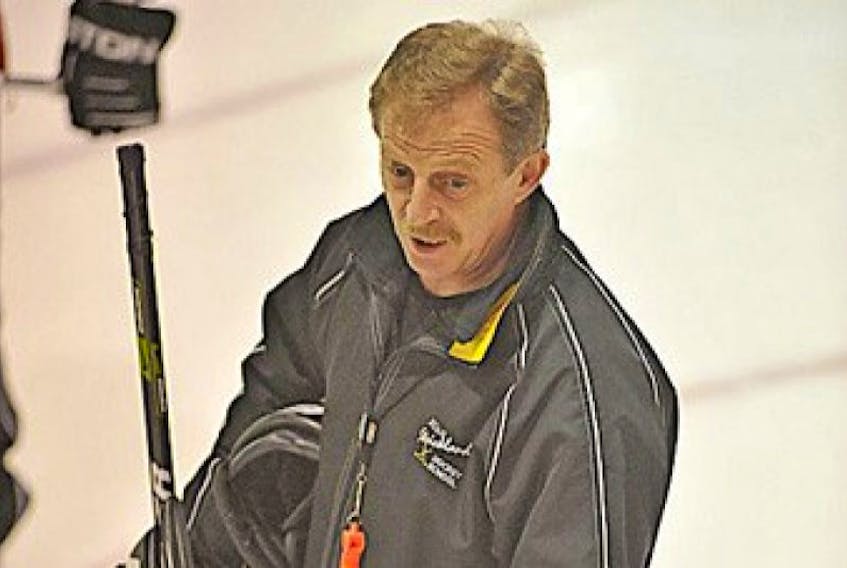Shaved eye brows.
Shaved private body parts.
That’s some of the hazing episodes Newfoundland and Labrador Hockey Hall of Famer Juan Strickland was exposed to as a 16-year-old playing university hockey with the Dalhousie Tigers back in the 1970s.
He was a victim, like so many others who had been humiliated and embarrassed by unpleasant things done to them by their teammates as a way to be accepted into the group.
It’s an initiation process that Strickland found very uncomfortable as a player and today — as a coach who has helped guide a lot of young hockey players in this province — it’s something that he believes has to be driven out of sport.
“You didn’t really want to be a part of it, but that was it you were a victim of it,” Strickland said Monday afternoon. “You were somewhat humiliated. It was meant to embarrass and humiliate you, sort of thing, and everybody went through it. It was part of the culture.”
Strickland says his hazing experiences as a hockey player back in the day were done in good fun and he never saw anybody hurt or offended.
He didn’t like being subjected to it at all, but it was something that was part of the initiation process to be part of the team, so the players just seemed to go with the flow and he was no different.
A trio of students are being disciplined and the school basketball program has been suspended as a result of an alleged hazing incident earlier this school year at Fatima Academy in St. Bride’s and police are looking into complaints of a possible hazing incident at Clarenville High.
The latest incident in Clarenville has resulted in five youth being charged with 13 charges that include four counts of assault, four counts of sexual assault, four counts of forcible confinement, and one count of sexual interference (touching, for sexual purposes, the body of a person under the age of 16).
Last year, the Royal Canadian Mounted Police opted not to lay charges in a hazing report at Stephenville High School that saw all school sports shut down while the investigation was being carried out.
Strickland says there is no place for hazing or bullying in sports and he has always had a zero-tolerance policy for it as a coach.
He has always believed that the coach is responsible for the safety of his players and that role includes conduct on and off the ice. So he will always be vocal when it comes to ensuring young athletes foster and develop in the right environment.
Back in the day, he said, it was only the guys in the room who could speak about anything that went on with the guys, but hazing incidents are reaching more people because of social media.
That should be something to ponder the next time they find themselves in an uncomfortable situation.
“It has to go away and the only way it can go away is we need to make these young people realize that (while) it starts out to be fun but somebody is being victimized and you don’ t know how that person is going to respond to the fact this happened to them,” he said.
Brady Griffin Hefford never experienced any type of hazing rituals during his Western Kings major midget career or his three seasons in the Maritime Junior Hockey League.
“There was zero tolerance for it. If you did do it then you’d be off the team and I think that was a good way to go about it because then everybody got closer,” Griffin-Hefford said Monday from Dalhousie University where he’s studying kinesiology.
Griffin-Hefford understands how some athletes may feel pressure to do things they feel uncomfortable about because they want to fit in, but he is quick to point out that the player has the power to say no and can’t lose sight of that reality.
He also suggests players who feel like they are being victimized reach out to one of the leaders on the team to see if it can be addressed. If that fails then a conversation with the coach would be a good starting point to get it dealt with.
With hazing rearing its ugly head again, Griffin-Hefford hopes high school athletes will become the leaders they can be and take a stand against any behaviour that is deemed uncomfortable or humiliating for another student they happen to call teammate.
Jordan King, a former teammate of Griffin-Hefford, said he’snever been exposed to hazing during his hockey travels, either.
King said his coaches, from major midget to junior, always made it clear to the players that no form of hazing would be tolerated and nobody pushed the limit because they knew their spot on the team would no longer be there for them.
“It definitely still exists, I would say, but it’s not as serious as it used to be and I think it’s more so just having fun amongst the team,” he said.









